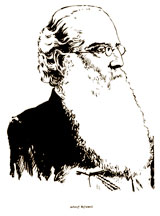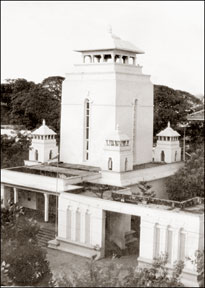Ananda and Olcott goes synonymous with Buddhism
121st anniversary of Ananda College and 100th death
anniversary of Col. Olcott:
by B. A. Abeyrathna
  We are in the process of commemorating the 121st Anniversary of
Ananda College and Col. Henry Steele Olcott, the Founder of Ananda
College. We are in the process of commemorating the 121st Anniversary of
Ananda College and Col. Henry Steele Olcott, the Founder of Ananda
College.
Early part of the eighteenth century was the beginning of an era of
suppression of the rights of the Sinhala Buddhists, their culture,
traditions and social position. It was also the awakening of the people
of this country.
In the beginning of the Sri Lanka history up to 1658, the Sinhala
Buddhist culture got mixed up with the North Indian and South Indian
culture. The invasion by foreign powers, brought with them, their
culture, religion and the life pattern and imposed those on the Sinhala
Buddhist community.
The Portuguese had introduced Roman Cathalism and the Dutch, the
Anglican Church. It was said that the main objectives of their
educational policy was admittedly the conversion of the people of Ceylon
to their religion.
In the book titled Ceylon and her People - Mr. N. E. Weerasuriya says
thus; "There were many of conversion of Sinhala Buddhists to
Christianity. One mode of conversion was the preferential treatment
given to Buddhists who became Christians. A government post carried
higher salaries, social position and other prospects. Buddhists became
"Government Buddhists and "Christian Buddhists".
'Pansala schools' (Temple schools) attached to the temples and for
centuries the education emanated from the temples. Those schools were a
part and parcel of the Sinhala Buddhists. The relation between the
teacher and the pupil was a traditional feature of the Sinhala
community. The Colonial rule did everything possible to replace the 'Pansala
education' with missionary schools.
In 1825 a dispatch to Lord Bathhurst, Governor Edward Barnes had said
that the missionary education system is likely to produce discontent
among the Sinhalese and it would generate hypocrites rather than
believers.
He further says: ".....In England the population is Christian and
therefore it is natural that all the schools and colleges should be
Christian establishments, but we have, I think absolutely carried the
same system in to the schools here, where the people are generally
Buddhists or Hindus; and one of the greatest defects of our school
system is, in my opinion, that it has got too much into the hands of the
clergy.
It has been considered mere as an instrument of the conversion of the
people to Christianity - than of general improvement in civilization.
"Ceylon and her People" great controversies, Wariyapola in 1865,
Udanvita in 1866, Gampola in 1871 and the greatest debate in Panadura in
1873 where the Lion debator (Vadibasinghe Thero), Ven. Miggettuwatte
Gunananda Thero led the Buddhists against the Christian church led by
Rev. David Silva to discuss and debate on the merits and demerits of
Buddhism and Christianity.
According to historical records that a crowd of 10,000 people,
Buddhist and Catholics witnessed the debate and in the end, Ven.
Miggettuwatte Gunananda Thero won it.
Dr. J. M. Peeble who was touring the world, gathered reports from the
press, details of the debate and published those in a book of about 100
pages.
His comments and criticism favoured the Buddhist doctrine rather than
the old time orthodox Christianity and this book reached the hands of
Col. Henry Steele Olcott of America, a Christian by birth. He was
convinced of the scientific basis of Buddhism and decided to visit Sri
Lanka, the beautiful land blessed by Thathagatha - Gothama the Buddha.
That was the first link connecting Col. Olcott with Sri Lanka.
Arrival of Col. Henry Steele Olcott
Olcott arrived in Sri Lanka on 17th May, 1880 with Madam Helena
Petrovna Blavatsky, a Russian lady who had taken a serious interest in
the great philosophy of Thathagatha the Gothama Buddha. His arrival was
opportune during an era when the Buddhist revival movement was gathering
force.
Born in August 1872 in New Jersey, USA Col Olcott was the elder son
of Henry Waicop Olcott. He was a Christian and specialised in the
science of agriculture, established an educational institution in
agriculture in USA.
He was made a colonel in recognition of his services to the Army
during the world war. After leaving the war service, he became a lawyer.
He married the daughter of Rev. Richard Morgan and had three sons and a
daughter.
Two of his sons died when they were infants. A week after his arrival
in Galle, he embraced Buddhism at Wijayanandaramaya. Col. Olcott moved
to Colombo on 8th June 1880 and an informal meeting had been held to
discuss the formation of the Ceylon branch of the Buddhist Theosophical
Society at a residence called "Redcliffe" in Slave Island with the
participation of leading Buddhists.
The Sri Lanka branch of the BTS was formed with the help of Ven.
Hikkaduwe Sri Sumangala Thero, Ven. Dharmarama Thero of Rathmalana, Ven.
Sri Sumangala Thero of Weligama, Ven. Migettuwatte Gunananda Thero of
Panadura and Mr. Don Carolis Hewawitharana.
The leadership of Buddhist revival movement thereafter passed on to
this organisation.
On 23rd October 1886, a gathering of Buddhist leaders - the laity and
the clergy was held to discuss broadly the plight of Sinhala Buddhists,
the suppression of Buddhists by the Colonial rulers, and the drawbacks
in education and their social position.
English Buddhist Academy
A press notice carried the news of this meeting and proposal for the
establishment of a 'Bauddha Shasthralaya' - , (English Buddhist Academy)
to promote English education among the Buddhists.
The chief speakers were Ven. Sipkadduwe Thero of the Vidyodaya
Pirivena, Ven. Miggettuwatte Gunananda Thero and Mr. C. W. Leadbeter.
The 'English Buddhist Academy' was established on first November 1886
at No. 61, Maliban Street with Mr. C. W. Leadbeter as the Principal.
Our gratitude
Col. Olcott arrived in Sri Lanka at a time when the Sinhala Buddhists
were being suppressed by the Colonial Govt. Their rights and the social
position were at stake.
He became a pioneer in establishing 'Buddhist Schools' to promote
English education to the Buddhists.
Having established a branch of the BTS he with the help of the true
Sinhala Buddhist Nationalists laid the foundation for the establishment
of Buddhist schools.
The first one being Ananda College, Colombo and he did not isolate
Ananda College, but established many other Buddhist schools in leading
towns, Dharmaraja in Kandy, Mahinda in Galle and Musaeus in Colombo.
He was a rare example of a foreigner who was decided to assist the
Sinhala Buddhists and lead them to fight for their lost rights. No other
person had contributed so much to promote English education for the
Buddhists.
The Anandians of yesterday, today and tomorrow will respectfully
remember this great educationalist with deep gratitude.
Col. Olcott was like the 'Northern star' during crisis situations. He
was like a lotus which rises up to meet the tide.
The writer is the Principal, Ananda College. |
